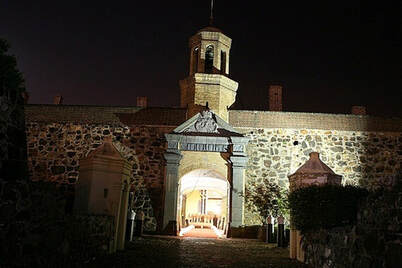 To Listen to a Message that Includes this Testimony click here Report to the Castle It was pitch dark and three hours before sunrise when I began my National Service in the South African Defence Force (SADF). My call-up papers had instructed me to report to the Castle in Cape Town 5am on 2 July 1979. Although from a very young age, I had been looking forward to my service in the military, now that I was involved in full time Missions at Hospital Christian Fellowship, it seemed like “a waste of time” to be “sidetracked from Missions” for two years military training and service. Anticipating the Last Days At the time, I was also so convinced of the imminent return of Christ that I found it hard to believe that I would ever be able to get back to Missions, as the Lord would have surely returned long before my two years in the military were completed! 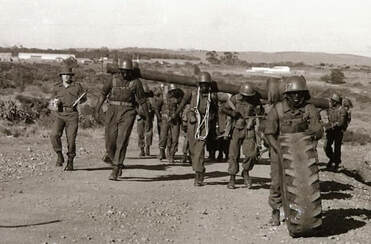 Oblivious to Oncoming Obvious Outreach Opportunities It was not out of any fears for inevitable hardships and dangers that were ahead, that I walked through the gates of the Castle with such trepidation. I was grieving the loss of the time and opportunity for Mission outreaches. I did not yet recognise the tremendous mission field I was entering, nor the evangelistic opportunities all around me. Through the Sally Port There were hundreds of young men like me, pouring through the gates and being directed to the second courtyard of the Castle, behind Die Kat (the old Governor’s residence). Roll call was read out. Instructions were given and we were escorted through the Sally Port (The Sally Port is a narrow exit point at the back of the Castle from which troops could sally forth during a siege. Most people have never noticed this Sally Port at the Castle) and across a footbridge to the Cape Town railway station, there to embark by train for Grahamstown. 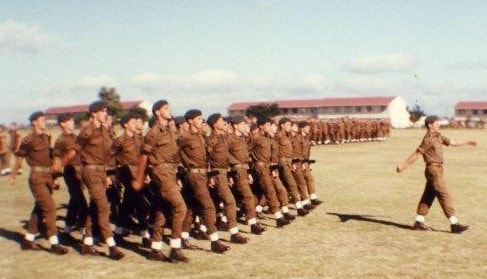 Overladen Recruits Having already hitchhiked long distances around the country for HCF, I had learned to travel light, with a collapsible sling bag. I wondered what some of these new recruits were thinking as they were struggling with large suitcases. Where did they think they were going to store their cases in a military bungalow? Learning from Those Who Had Gone Before From my Father, who had served all six years of the Second World War in the Royal Artillery, first in the Western Desert Army, then as it was reconstituted into the Eighth Army and from my brother who had served in the Rhodesian Army, I had some idea of what was coming. But evidently many of those around me were oblivious of the fact they would only have a very small metal half cupboard to the side of their bed and a metal trunk (trommel) at the foot of their bed. As these had to be open for inspections, with only regulation military equipment and uniforms in them, where did they think a suitcase full of civilian gear was going to fit in? As the military would soon fully equip us with a whole new kit, right down to boots and running shoes, there was very little from our civilian life that we would need, or even be allowed. I had more books than anything else in my bag. The Odd One Out Most of the young men on the train were Afrikaans speaking and most seemed to know one another. There were whole Matric classes from the same school represented and it soon became clear that I was the odd one out. I was the “Engelsman”, “Oud Rhodesiana” and the “religious fanatic” (“Soul Tiffie”), who did not appreciate the apparent hilarity of their dirty jokes. We had not even reached the military base before I was already finding myself the brunt of many jokes and some hostility. I buried myself in my books and Bible and ignored the rowdiness of those around me. Grahamstown As we arrived at Grahamstown Railway Station, we were ushered out of the train and onto Bedford trucks. I saw my first glimpses of the Frontier town of the 1820 Settlers, Grahamstown, through the back of a Bedford truck as we raced through this quaint and picturesque town of many churches and Rhodes University. 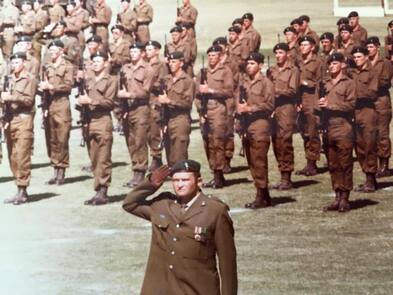 Welcome to the SADF As we disgorged onto the parade ground, the first words I heard from the Sergeant Major were: “ANGLICANS! ASSEMBLIES OF GOD! BAPTISTS! BRETHREN!...” We were divided up into our Denominational affiliations. All around the perimeter of the parade ground were tables with clerks writing out our details for the roll call of the various church denominations. I was soon to find out that church attendance on Sundays in the SADF was compulsory. In addition, we would be required to attend interdenominational chaplain services on the base, every week. Every morning would begin with Prayer Parade before Roll Call, the raising of the Flag and orders for the day. Our Most Important Weapon Even before we were equipped with our R1(FN 7.62mm) Rifles, we received our Bibles – which we were required to have at all times. It was part of our daily inspection. The message from the Minister of Defence, P.W. Botha, printed on a page inserted in front of the Bible, informed us that this was the most important item in our essential equipment and our best weapon. 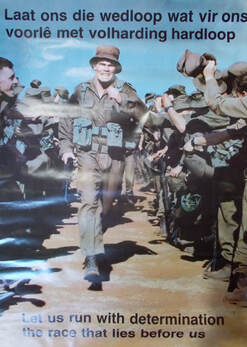 Funding Bible Translations Soon, I learned that our “voluntary tithes” would be automatically deducted from our military salaries. These tithes would not go toward the chaplaincy, as the military budget already catered for that, but to the Bible Fund. Not for our Bibles, those were a gift, but it would go to the Bible Society of South Africa Translation and Printing Projects, to make Bibles available to the various black nations throughout South Africa, South West Africa and further North across the border. In fact, the SADF was one of the biggest funders of Bible Translations into indigenous African languages in the world. At that time, Cape Town was one of the premier Bible printing cities in the world. “Well – What Are You?” After the Sergeant Major had alphabetically read out an incredible variety of church denominations, there were still four men standing in the middle of the parade ground. “WELL? WHAT ARE YOU?” bellowed the Sergeant Major. “Atheists” We all looked with interest, wondering what on earth they could be, as it would seem that every possible religious affiliation had already been listed. One of the four stepped forward and said in a hesitant voice: “Atheists, Sir!” 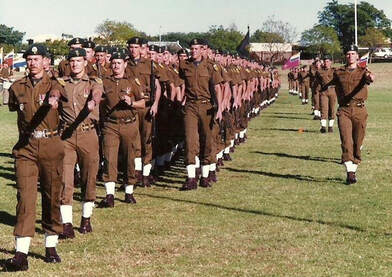 “This is a Christian Army!” “ATHEISTS! ATHEISTS? THE COMMUNISTS ARE ATHEISTS! THE ANC ARE ATHEISTS! SWAPO ARE ATHEISTS! THIS IS A CHRISTIAN ARMY! SEND THEM TO THE PENTECOSTALS!” The Sergeant major was adamant! So, instead of going to a 40-minute Anglican service, or one-hour Baptist service, these four “atheists” were required to attend 3-hour Pentecostal services every Sunday. Inspiration from General Patton This was just the beginning of a whole lot of other surprises as I was introduced to Basic Training in the SADF. Evidently, somebody really liked American General George S. Patton. There were a number of his quotes on huge billboards around the perimeter of the parade ground, such as: “DO NOT DIE FOR YOUR COUNTRY – MAKE THE OTHER POOR DUMB BASTARD DIE FOR HIS!” and “BETTER TO LOOSE SWEAT IN TRAINING THAN BLOOD IN BATTLE!” Better to Loose Sweat (and Blood) in Training As we were soon to discover, the SADF took these pearls of wisdom from General George Patton most seriously. In fact, on a number of occasions, our Staff Sergeant proudly reminded us that the SADF lost more men in training than it did in battle! If that was true, it did not seem to be that much of an encouragement at that time. 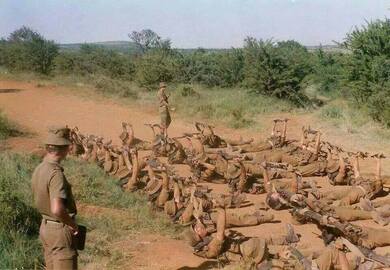 Breaking Bones and Necks on the Obstacle Course In the coming weeks and months, we came to appreciate his point. Numerous national servicemen were injured in training, including broken legs, arms and necks in negotiating the obstacle course at speed. Some soldiers died of pneumonia. To emphasise the extremes in South Africa, we heard of three other national servicemen who died of heat exhaustion at 8 SAI (the South African Infantry Base in Upington, in Northern Cape). Thinned Out by Selection Soon our overflowing base of 2,000 national servicemen was thinned down to about 600, by selection and reassignment. The tents came down as the barracks could adequately accommodate those of us who remained. A Wet Winter Being a winter intake, P.T. at 5am was in pitch dark, often in the pouring rain. Every morning our press-ups were frequently in huge puddles. Heat, to us, seemed to be as remote as the moon. We always seemed to be cold and wet. Although we were equipped with two sets of boots, neither of them ever seemed to get dry during basic training in the wet winter. 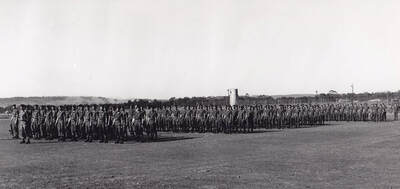 Make Your Stand for Christ Early Bill McDougall, of the Leprosy Mission, had advised me before my call up: “Be sure to make your stand for Christ early. Always bow your head and close your eyes in prayer before meals and look out for others who do so – to identify fellow Christians.” Grace at Grahamstown At my first meal, at the Mess, I bowed my head and committed my time of national service into the Lord’s Hands. I thanked the Lord for His mercy and grace, for the food, for my health, praying for the opportunity to be able to witness to other national servicemen. As I raised my head, everyone at the table around me were laughing and looking at me. Then I saw why. My meat was gone! Watch and Pray “Ok, where is my meat?” The men around me collapsed into even greater laughter. One of the men commented: “Didn’t Jesus say that you must ‘Watch and pray?’” Everyone at the table seemed to dissolve into convulsions, some holding their sides while tears streamed down their faces. Yet, for all the hilarity, no one returned my meat. So, I learned to “Watch and pray.” In future, I would stick my fork firmly into the main course, fold my arms around my plate and protectively bow over it in prayer. Speaking Up At the first Chaplains service, 40 years ago, I asked the Chaplain if I could say a few words. It was quite intimidating standing in front of hundreds of other young men, who all looked the same as me, with shaven heads and dressed in the same brown uniforms. My heart was pounding and it was actually a terrifying moment. Yet, I knew I had to do what Mr McDougall had advised. I had to make a stand. I swallowed hard and said loud enough for all in the hall to hear: “I love the Lord Jesus Christ with all my heart. I want to honour and serve Him during my next two years here. If anyone else would like to join me for Bible study and prayer each night, please see me afterwards.” The Bible Study and Prayer Fellowship There were some sniggers and chuckles, but a number of men sought me out, including Joe and Alex von Alten-Reuss, twins, who had recently come to Christ. I sought and received permission from the chaplain to use one of the rooms in the chapel for evening Bible studies. Although he commented that he doubted that we would find any time during our basic training. Basics Soon, I understood what he meant. Basic training in the South African Infantry at that time was very intense. They kept us running from 5am in the morning till 10pm at night. P.T., drilling, long route marches, lectures, practicals, obstacle courses, leopard crawling, daily inspections and Vasbyts. 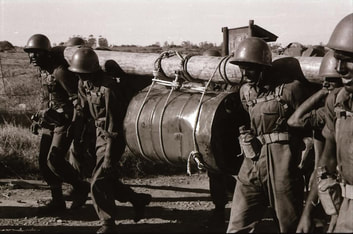 Vasbyts These were normally 8,4km races which required team work as each platoon had to run around the outside of the base with poles, 200 litre oil drums and huge truck tyres. These awkward weights and shapes we had to carry and we had to make sure that we all arrived at the finish line at the same time. It was essential that the whole platoon worked together as a team. You do not win in Infantry training by being the first person across the line. It is only when the whole team with the last member crosses the line. The strong must help the weak. We were frequently carrying someone else’s rifle, or backpack and even taking the arm of some individual who had passed out, or was struggling, between two of us and running with them somewhat off the ground. 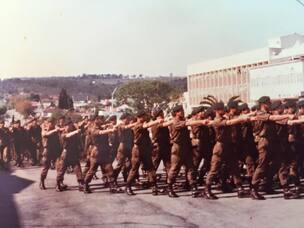 At the Double We were never allowed to walk. Recruits were in serious trouble if we were found walking anywhere. It had to be running (“at the double”), or marching smartly with arms swinging shoulder height in unison with any others we were marching with. Chaplains Assistant Because I was so obviously a “religious fanatic”, the chaplain appointed me to be his assistant to take care of church services, set out the tea cups for Sunday morning services, clean and wash the tea cups after the service, see that the church building was regularly cleaned and most excitingly, I was to ring the church bell before Sunday morning services. Ringing the Chapel Bell The first Sunday, I went with great enthusiasm to ring the church bell. I looked up into the tall tower, took firm hold of the rope and pulled it with much gusto. I heard one gadang and then nothing! I looked up to see what was wrong. The metal tong of the huge bell was plummeting straight down towards my head! I leapt out of the way just in time for the bell’s tong to smash into the concrete, leaving a huge dent where I had been standing. (That same hole was still there in the concrete when I took my son, Calvin, for a visit to my old base many years later.) My heart was pounding. I must have pulled the rope so hard that the metal tong had unhooked itself from the bell. If I had not jumped out of the way in time, it would have gone straight through my skull! For Whom the Bell Does Not Toll Well, that was a disappointment. All I had managed to do was to get one dong out of the bell and it would be months before the fire brigade came from town with a long enough ladder to be able to return the tong to the bell. Meanwhile the story of how this enthusiastic new recruit managed to disconnect the tong from the church bell was soon known throughout the battalion. The fact that the bell did not ring for a couple of months after that, ensured that this story was repeated many times over, much to my embarrassment. The Fellowship However, as the chaplain’s assistant, I had a key to the church building and our little Bible study and Prayer fellowship each night grew steadily. Almost every week I had the joy of leading someone else to the Lord. Shannon, Matthew and many others joined our group. Sometimes we were praying right up to the bugle for Lights Out at 10:15pm. Some nights we kept going past midnight. Prayer Chains Some Saturdays we had Prayer Chains, through the night, each taking two hours duty, just as we would on guard duty, praying through Operation World. It was while praying for our neighbouring states, that I first learned of Mozambique being “the least evangelised country in the Southern Hemisphere”, a communist country, where there was not one Bible for a thousand people. The beginnings of the vision for our Cross-border Bible smuggling missions began during that all-night Prayer Meeting. 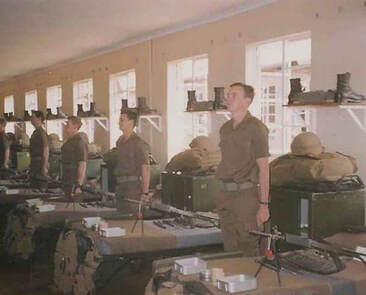 Inspections Looking back, I am not too sure how we managed. Infantry training was intense. Every morning inspections were demanding. The floors had to be so well polished that they shone like mirrors. Our beds were ironed so perfectly square, that I actually spent most of my time in the Army sleeping on the floor, to ensure that my meticulously ironed bed was ready for inspection in the morning. Even the concrete floors and the washrooms had to be polished to a high sheen. Every item in our cupboard, or trommel, had to be cleaned, ironed and spotless. Our boots shone and on the one occasion that the Corporal found some dust in my Rifle barrel, I found myself On Orders before the Captain (Company Commander) and sentenced to extra punishment P.T. in full kit. Needless to say, they never found any dust in my barrel after that. Guard Duties Conducting Bible studies and Prayer meetings every night, of course, had to be juggled between Guard duties, night marches and other operations. However, I always found other soldiers willing to exchange their later hours for earlier ones, so that they could get to sleep earlier and I could still make the Bible study before starting the last watch of the night. So generally, I ended up with the 10pm to 12pm and 4am to 6am duties - the least popular hours, but that still enabled me to make the daily Bible Study every night. 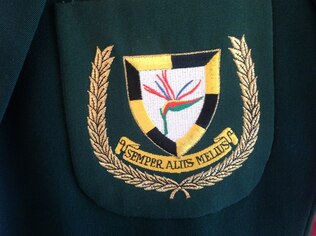 The Vision for Frontline Fellowship It was out of this military Bible Study that the vision for Frontline Fellowship developed. It was the intense beginning of an incredible adventure of Discipleship, which over the last 40 years has taken me across four continents and 38 countries, over 140 missions behind enemy lines, smuggling hundreds-of-thousands of Bibles to persecuted Christians and serving the suffering in communist and Muslim lands. Whether under fire, or in prison, sick or healthy, I have experienced the reality of God's mercy, guidance, provision and protection for four incredible decades. God's Word Never Returns Void Those two years of intensive military training and service, Bible Study and many hundreds-of-hours of prayer have continued to bear fruit in my life and in the life of our Mission. The will of God will never lead you where the grace of God cannot keep you. “When you pass through the waters, I will be with you; and through the rivers, they shall not overflow you. When you walk through the fire, you shall not be burned, nor shall the flame scorch you.” Isaiah 43:2 When the time comes for you to make a stand, stand up boldly. When the time comes for you to speak up, speak courageously and clearly. When the time comes for you to step out, step out confidently in order to fight the good fight of Faith. Dr. Peter Hammond Frontline Fellowship P.O. Box 74 Newlands 7725 Cape Town South Africa Tel: 021-689-4480 Email: [email protected] Website: www.FrontlineMissionSA.org See also: 42 Years Ago – Conversion to Christ and Call to Missions 37 Years Ago – Frontline's First Mission to Mozambique Born in Prayer 43 Years Ago - Conversion to Christ
0 Comments
Leave a Reply. |
Archives
July 2024
Categories
All
|
"And Jesus came and spoke to them, saying, “All authority has been given to Me in heaven and on earth.
Go therefore and make disciples of all the nations, baptizing them in the name of the Father and of the Son and of the Holy Spirit,
teaching them to observe all things that I have commanded you; and lo, I am with you always, even to the end of the age.” Amen.” Matthew 28: 18-20
Go therefore and make disciples of all the nations, baptizing them in the name of the Father and of the Son and of the Holy Spirit,
teaching them to observe all things that I have commanded you; and lo, I am with you always, even to the end of the age.” Amen.” Matthew 28: 18-20
|
P.O.Box 74 Newlands 7725
Cape Town South Africa |
|
 RSS Feed
RSS Feed
